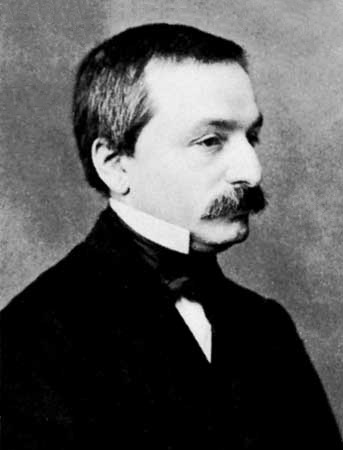
Leopold Kronecker
Leopold Kronecker (German: [ˈkʁoːnɛkɐ]; 7 December 1823 – 29 December 1891) was a German mathematician who worked on number theory, algebra and logic. He criticized Georg Cantor's work on set theory, and was quoted by Weber (1893) as having said, "Die ganzen Zahlen hat der liebe Gott gemacht, alles andere ist Menschenwerk" ("God made the integers, all else is the work of man").[1] Kronecker was a student and life-long friend of Ernst Kummer.
Leopold Kronecker
7 December 1823
29 December 1891 (aged 68)
- Arithmetization of analysis
- Kronecker delta
- Kronecker foliations
- Kronecker limit formula
- Kronecker symbol
- Kronecker product
- Kronecker quiver
- Kronecker substitution
- Kronecker's congruence
- Kronecker's Jugendtraum
- Kronecker's lemma
- Kronecker's theorem
- Kronecker–Capelli theorem
- Kronecker–Weber theorem
- Hermite–Kronecker–Brioschi characterization
ForMemRS (1884)
Scientific activity[edit]
Mathematics research[edit]
An important part of Kronecker's research focused on number theory and algebra. In an 1853 paper on the theory of equations and Galois theory he formulated the Kronecker–Weber theorem, without however offering a definitive proof (the theorem was proved completely much later by David Hilbert). He also introduced the structure theorem for finitely-generated abelian groups. Kronecker studied elliptic functions and conjectured his "liebster Jugendtraum" ("dearest dream of youth"), a generalization that was later put forward by Hilbert in a modified form as his twelfth problem.[6] In an 1850 paper, On the Solution of the General Equation of the Fifth Degree, Kronecker solved the quintic equation by applying group theory (though his solution was not in terms of radicals: that was already proven impossible by the Abel–Ruffini theorem).
In algebraic number theory Kronecker introduced the theory of divisors as an alternative to Dedekind's theory of ideals, which he did not find acceptable for philosophical reasons. Although the general adoption of Dedekind's approach led Kronecker's theory to be ignored for a long time, his divisors were found useful and were revived by several mathematicians in the 20th century.[7]
Kronecker also contributed to the concept of continuity, reconstructing the form of irrational numbers in real numbers. In analysis, Kronecker rejected the formulation of a continuous, nowhere differentiable function by his colleague, Karl Weierstrass.
Also named for Kronecker are the Kronecker limit formula, Kronecker's congruence, Kronecker delta, Kronecker comb, Kronecker symbol, Kronecker product, Kronecker's method for factorizing polynomials, Kronecker substitution, Kronecker's theorem in number theory, Kronecker's lemma, and Eisenstein–Kronecker numbers.
Philosophy of mathematics[edit]
Kronecker's finitism made him a forerunner of intuitionism in foundations of mathematics.
Kronecker was elected as a member of several academies:[2]
The 25624 Kronecker asteroid is named after him.